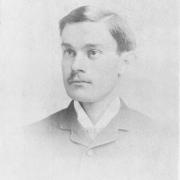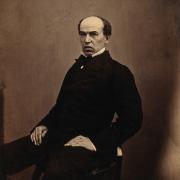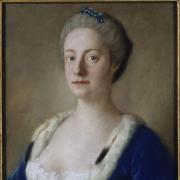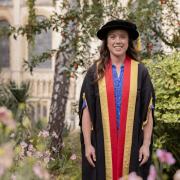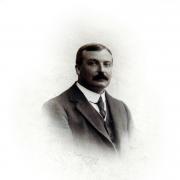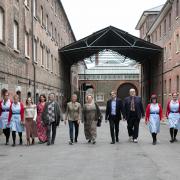Goudhurst-based Sarah Sykes (known as SD Sykes professionally), a writer of historic murder mysteries discusses her series of books set in 14th-century Kent about a medieval investigator

“I just love the area’s historic buildings,” says Sarah Sykes. The author, who writes under the name SD Sykes, is talking about her love of the local properties she visited for inspiration while writing her historical mystery novels.
Having lived in Somerset, London and Manchester before moving to Kent, she spent many afternoons getting to know the county by exploring the estates of Scotney Castle, Ightham Mote and Penshurst Place.
Sarah’s success story began in 2012 when she attended a novel-writing course run by literary agents Curtis Brown. Impressing one of the agents with her debut novel Plague Land, they landed her a three-book deal with publishers Hodder & Stoughton and the rest, as they say, is history.
The Somershill Mysteries are set in 14th-century Kent and focus on the young lord of a fictional estate near Tonbridge, called Somershill Manor. The country has just been devastated by the plague of 1348-1350 and Kent has lost an almost half its population, including the young hero’s father and older brothers. Never expecting to have responsibilities, Oswald de Lacy suddenly finds himself running a large estate.
“The novel writing only really kicked off five or six years ago,” Sarah says. “But I’ve always written on the side – in fact I think you’re kind of born a writer.
“I did an MA in writing in the nineties and I specialised in scriptwriting; working on screenplays, radio plays and that sort of thing. They taught me a lot about narrative design but a novel is like a marathon and you need stamina to finish it. I wasn’t sure that I could do that really; it was a daunting prospect.”
Sarah had attempted novels before, only to find them petering out around the halfway point. But even so, joining the course at Curtis Brown was more for pleasure than a last-ditch attempt to carve out a career as a novelist.

“At that time I was in my late forties and I wasn’t sure writing was for me. I never thought it would be anything more than a hobby. It’s a fierce industry, after all. I just wanted to see what I was capable of and the course gave me the will to finish.”
Writing a novel is a complicated thing at the best of times but adding to the challenge was the fact she was writing about life in Kent 650 years ago. As with any work of historical fiction, painstaking research would be as vital as a good plot.
“I’ve always been an avid reader of crime,” she says. “So I knew I wanted to write a crime novel and the one thing that really appealed to me about writing about the past is that the whole forensics thing wouldn’t be an issue.
“So while I had to do a lot of historical research, I didn’t have to worry about the challenges that would face a contemporary crime novel. And that gave me a chance to focus on things like deduction and characterisation, which is actually what interests me most about crime fiction anyway.
“But the research part just has to be done. It’s a challenge and you hope to get it right.”
After Plague Land, in which young Oswald de Lacy becomes an unlikely investigator following the murder of two local girls, came The Butcher Bird in 2015.
With an even darker plot, dealing with the discovery of a dead baby and the kind of superstitious hysteria that would have been rife in those times, it again sees Oswald’s powers of deduction called into play. It also looks further into the politics of the era and the dreadful effects of poverty.

For research, Sarah starts by reading as much she can about the time period and getting to know the areas she writes about. This means a lot of visits to her favourite stately homes and historic estates but to other settings too.
Her latest book, City of Masks, is the only one so far to be set almost entirely away from Kent, this time following her medieval sleuth to Venice.
“I went out there and tried to see as much as I could and when I came back I worked out exactly where the novel was going. Then I went back out again and was able to really hone the research I needed to do. It was a really tough gig going to Venice for work!”
Although this particular research was undoubtedly fun, changing her location from her comfortable corner of west Kent to 14th-century Venice meant a lot more hard work. It took her twice as long to complete City of Masks – in which Oswald and his mother stop off at Venice during a pilgrimage to the Holy Land, only to find themselves surrounded once again by murder and intrigue.
Having learned more about ancient Venice than she could ever need to know, she admits she has to be strict with herself by putting in just the right amount of historic detail to transport her readers without boring them. There is also, she says, the ever-present pressure from history buffs to get it right.
“I do try to get it right but there are things that I will bend a little to meet the narrative. At the end of the day it is a work of historical fiction after all.
“Although I’d be mortified if there was some horribly obvious anachronism – like people smoking or something.”
The Middle Ages have always fascinated Sarah but she says her decision to set her stories in the 1350s was mostly influenced by moving in Kent. Living in Tunbridge Wells when she first put pen to paper, and now in Goudhurst, she has fallen in love with the area and its past.
“This part of Kent is so rich in medieval history. I’m looking out of my window across the valley right now and I can see timber-framed buildings. I’m very inspired by the county that we live in. This part of Kent is all quite bucolic, with orchards and hop fields and castles, so the past spoke really strongly to me from here.”
Keen to point out that while she received an initial deal for three books, they are not a trilogy, Sarah considers her novels a series that can be read as stand-alone stories.
Her hero, Oswald, is an interesting character who she takes on a journey of self-discovery. Blossoming from the young lord struggling to cope with the responsibilities of his estate, we see him become a force to be reckoned with. In City of Masks, however, he is a changed man, haunted by some event we’ve not yet been privy to and running away from his life in Kent.
He’s dealing with his own demons as much as he is with a new murder case. And Sarah confirms she’s not finished with Oswald just yet – although she’s still in discussions about adding another book to the series.
“In the one I’m proposing to write next he’s 29 so he’s got a lot more life in him. That time period, from just after the plague until the Peasant’s Revolt, is a very rich period of history for England and there’s an awful lot more I can use. I don’t feel tired with the source material yet. As soon as I do, then I’ll stop.”
In the meantime, she’ll continue exploring Kent – looking for inspiration. “There’s something that just speaks to me about the Kent landscape,” she says. “Particularly the Weald area. Every day, when I go out, I’m just astounded by the beauty of it.”




